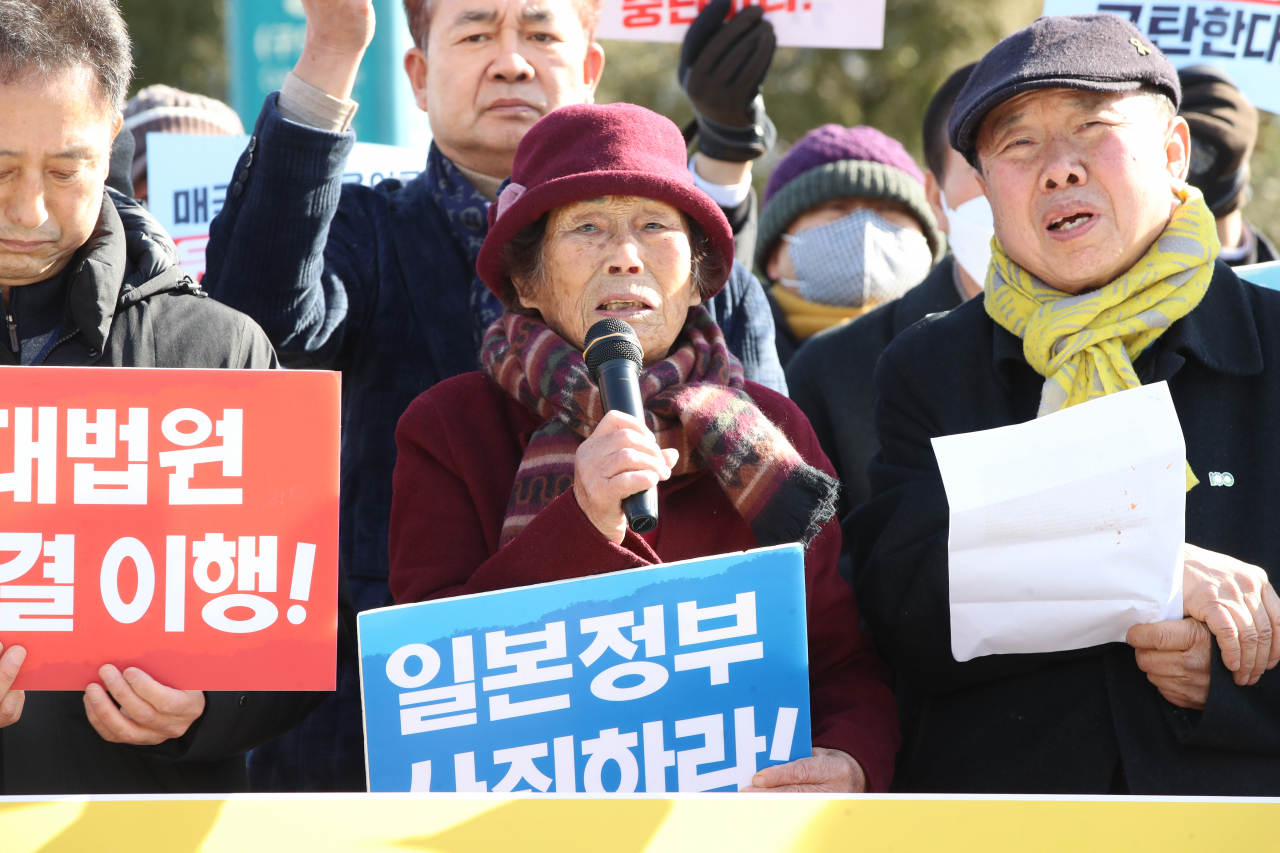 |
Victim of Japanese forced labor Yang Geum-deok speaks at a press event held in May 18 Democracy Square in Gwangju. (Yonhap) |
High court judges in Seoul are set to resume trials on forced labor issues involving Japanese companies in May, regardless of whether Japan continues not to respond to the court's request to transmit judicial documents to defendants there.
The Seoul High Court on Jan. 31 carried out "services of public notice" on two civil court trials where forced labor victims individually seek damages to companies that had mobilized them during World War II.
Under the "services of public notice," junior administrative officers post the relevant documents on bulletin boards, an alternative method to document transmissions to the concerned parties via Japan's central government -- a mechanism enshrined by the Hague Service Convention in 1965.
The court is not required to send relevant documents to Japanese defendants based outside Korea two months after the public notice to begin or resume the trial.
The appellate court has yet to start the trial over a 1 billion-won ($790,000) suit brought forward by 17 forced labor victims and their bereaved families, including a man surnamed Song, against seven Japanese companies that were alleged, or found to have, mobilized workers during World War II. The trial on hold since August as Japanese entities' failed to have the required documents delivered.
Another court trial over a damage suit by 63 plaintiffs against Mitsubishi Heavy Industries has also been postponed since June.
Both trials will resume on May 11, according to the Supreme Court of Korea's electronic case records.
These civil cases are among the 70 suits in which forced labor victims are seeking damages over forced mobilization of Korean citizens to use them as laborers during the Japanese occupation of Korea.
Three out of 70 cases have already had a top court ruling that gave the forced labor victims the upper hand.
However, not all court verdicts here were in favor of the victims. The Seoul Central District Court in June 2021 dismissed an 8.6 billion won suit filed in 2015 initially by 85 forced labor victims, including Song, against 17 Japanese companies, saying the individuals are not valid entities to file a suit against the companies as, specifically in that case, the matter had been settled in the 1965 Normalization Treaty between Korea and Japan.
Song and 16 more plaintiffs appealed the decision. The number of defendants were then reduced to seven, including Mitsubishi Heavy Industries and Sumiseki Materials.
During Japanese colonial rule from 1910 to 1945, Japan had mobilized over 6 million Koreans into forced labor in and around the Korean Peninsula.
Japanese firms have been refusing to compensate the victims. Mitsubishi Heavy Industries defied a Supreme Court ruling in 2018 to pay compensation to the forced labor victims and did not comply with orders to liquidate its assets to make up for the compensation. This led to a decision by the Foundation for Victims of Forced Mobilization by Imperial Japan to instead use funds from Korean companies to compensate the victims, only to face local backlash.






![[Today’s K-pop] Blackpink’s Jennie, Lisa invited to Coachella as solo acts](http://res.heraldm.com/phpwas/restmb_idxmake.php?idx=644&simg=/content/image/2024/11/21/20241121050099_0.jpg)
